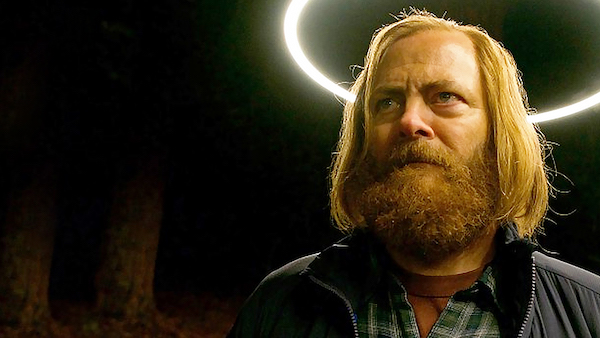Review: Devs vs Westworld – How Would We React to True Determinism?

Two of this year’s biggest, shiniest, mind-bendiest sci-fi series, Alex Garland’s DEVS on Hulu, and Jonathan Nolan and Lisa Joy’s WESTWORLD season 3 for HBO, cover nearly identical themes, while sharing several plot devices.
Both tell stories of emotionally scarred billionaires with god complexes, who both run seemingly unstoppable tech companies, which both create giant evil supercomputers (though one is a pulsing sphere, the other a glowing cube). And who both use that limitless data processing power to make machines capable of predicting the future, in order to “fix” what they see as wrong with the world.
And yes, in both we follow defiant young women (though one is technically a robot) who refuse to buy in to the future these algorithms predict (while with the help of frequently confused male sidekicks), sacrifice themselves to destroy both the machines and their creators.
Where they diverge are their respective takes on how predicting the future is achieved, and what doing so might mean for humanity.
Quick critical aside: They also diverge in quality and clarity.
Though Westworld seems a lot more fun on the surface, what with the futuristic vehicles, gunfights, explosions, and super-robots doing cool martial arts, the show relies so much on surprises and reversals, it’s hard to know what’s ever really going on.
What are these characters really trying to achieve? Are they succeeding or failing? What am I rooting for, exactly? Which makes Westworld hard to care about as a story, even if as a show it’s all very enjoyable to look at.
Devs, on the other hand, takes a more moody, atmospheric tone I certainly wouldn’t call “fun”. It’s weird and gorgeous and unsettling; very stoic, and largely philosophical.
But despite its galaxy-brain core concept, it tells a clear story — where each characters’ actions make basic sense based on their desires at any given time — while untangling the show’s surprises clearly advances our understanding of the larger ideas the show wants to explore.
If you only watch one for both aesthetic pleasure and discuss-ability: Devs is the clear winner.
OK, back to the discussion-worthy stuff.
Like the best sci-fi, both shows extrapolate out from real-world ideas. But as I said before, they depict different paths to how we arrive at these dystopian technologies.
In one, our prison is our own creation, in the other, it’s something we discover.
Westworld suggests that if we had enough people’s full behavioral data, we can basically know the course of the rest of their lives. From there, we can optimize society as a whole.
This isn’t too far past some shady experimentation Facebook has done, where they’ve shown “happy” or “angry” posts to different sets of people to measure the results. A little tweak here, a little tweak there, and eventually you get to control.
This is a man-made version of determinism, enabled by AI.
Devs on the other hand goes all the way down to the molecular level. This, too, is based on real physics. Essentially, if the entire universe is molecules reacting to one another, that’s no different for our bodies, or even our brains. It’s just one big wind-up toy playing out its course.
This is backed up by neuroscience which shows that, *technically*, our bodies take an action nanoseconds before our brain “commands” them to. In fact, the feeling that we’ve made a decision may be just a thing we evolved to make sense of the world.
So according to Devs, we didn’t build a thing that took away free will. Because of the deterministic nature of the universe, we never had it to begin with. We finally just built a machine powerful enough to prove it — and show us what comes next.
So of course, it makes sense that these two versions of determinism lead each show to a different outcome, once people discover what these machines can do.
In Westworld, the populace riots against the tech giants imposing control. In Devs, the few characters who fully reckon with living out a pre-determined future gain a Zen-like calm, but also seem hollowed-out and lifeless.
But in both, our heroes are compelled to destroy this technology, even if it means their own end. Because they both see that life with this kind of power in the world may not be livable — whether we stop it from being true, or just decide to live in blissful ignorance of our pre-determined reality.